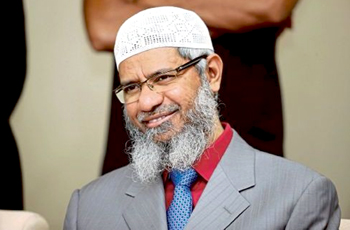Mumbai, Jul 16: Dr Zakir Naik, who is known as the authority on comparative religion, has reportedly filed defamation case against 10 media houses for making baseless allegations against him and airing his video clips out of context to mislead people.
When asked about his plans to return to India this year, he said: “For media trial? I can answer to allegations in a better way from where I am. I have served defamation on ten media houses. No investigating agency or officer has approached me till now,” said Dr Naik.
“I have again and again said that killing an innocent is like killing entire humanity. I condemn terrorism and also the attack in France though I am yet to get more information on it,” said Naik as he started his conference.
On people who were part of his organisation but were questioned or youths that went missing had met him, Naik said, “I meet thousands of people and they take pictures with me. How am I supposed to know about each of them.”






Comments
Well Done Dr. Zakir Naik. We had enough of this media misrepresenting the facts to please the people who are in power & spread the hate in common man, and help the fulfillment of the Hidden agenda of the corrupt politicians. Thanks for taking this great step. A peace loving man of any religion will support you...... Insha Allah Victory will be yours.
Please watch his team member junaid khan recent interview about his income and behavior with others
Even his conversion is well planned drama
This bussiness is much better than dargah bussiness
It is good that the media houses are being sued for defamation. Media should stop slandering and making false stories against people. Only when an FIR / case is registered, should they break the story.
This has been going on for such a long time and a stop has to be put. Arnab Goswami and his type have taken a beating out of this case. Even the government has lost a lot of credibility because of this case.
As per naik media aired his videos which are out of context to mislead the people!!!!!!
If so my question is then why zakir naik blind followers are urging other people to watch his videos in youtube if dey are out off context?...as per his followers if some1 converts to islam after watching his videos then its good for socity if he becomes terrorist den its out of context...hahaha
Shame on RSS agent Arnab Go cow swami,
you will not come up'' time will come your realy face will come out and public will spit your face,for money and power not lift up god know the reality and he is the planer.
Well done.. WE ARE WIth U Dr. Zakir Naik...
People are Fooled since decades with manipulating the facts and presenting to the public...
Presenting news with suits and ties and make up doesnt make anybody Good and Trust worthy... We should look at who is behind it... there are many corporations who play with the minds of people... who lobby all this evil propagands even the cheddis have fallen to this category.
We should teach this decievers a lesson...
But ALLAH has power over all things... Those who know ALLAH, will never be in FEAR of any situation.. May ALLAH make us one of them.. it is the greatest blessing from the CREATOR of all the Exists.
Insha Allah, you will suceed Zakir Saab, These dogs like Arnab gooo sami, Naren should be taught a lesson for ever...... WELL DONE. WE WISH GOOD LUCK....
Add new comment